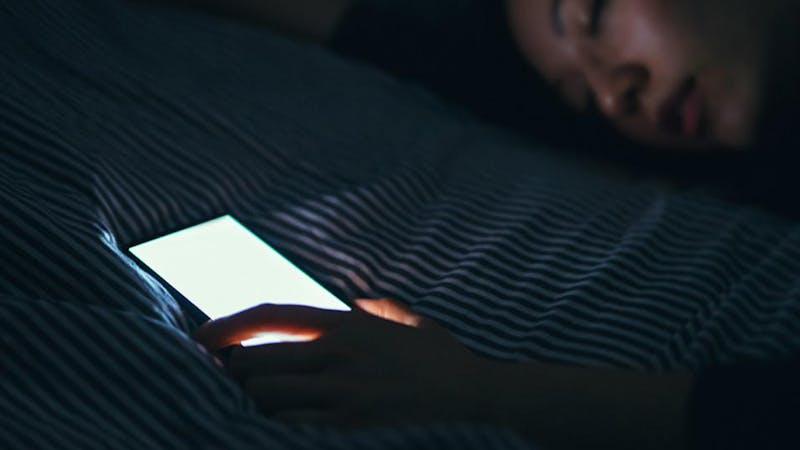
Are You Getting Good Sleep?
Many health conscious folks have a strong awareness and commitment to the relationships between nutrition, exercise and health, but what we often overlook is sleep! Without proper sleep, all those efforts may be getting thwarted and you may not even know it. Sleep is connected to your mood, hunger, athletic performance — everything! Here are 11 sleep mistakes you are probably making, plus some tips on how to get a good night’s sleep every night.
Mistake: Too Much Light
Got the TV glaring or a light shining on the nightstand? While it may seem outrageous, your body prefers a dark environment to trigger the proper release of melatonin, a hormone that helps set the stage for your overnight sleep cycles, where many additional hormone shifts occur. According to a study published in JAMA, exposure to artificial light was linked to weight gain in women. Subjects that slept with large amounts of light in their room (such as a TV) had a 17% greater risk of gaining 11 pounds over the time the study was conducted. Similar studies have also linked this poor lighting situation to obesity, diabetes and certain types of cancer.
Mistake: You’re Off Schedule
Whether you are conscious of it or not, your sleep quality benefits from a regular schedule. A study published earlier this summer supports that steady sleep and wake up times should be the goal — even just a one-hour a night change can have a negative impact on health. The moral to this bedtime story: Going to bed and waking up at the same time (yes, even on the weekends) is a key step to better zzz’s.
Mistake: You Try to Bank Sleep
Thinking you can burn the midnight oil all week and “catch up” on the weekend? Think again! The same study that emphasized the need for a solid sleep schedule also determined that getting sporadic amounts of sleep from night to night multiplied problems with the metabolism of participants.
Mistake: You Underestimate the Power of Caffeine
Caffeine is a stimulant that increases heart rate and effects blood flow. While tolerance varies, no matter who you are, a jolt of caffeine will give you a buzz. Caffeine half-life can be as much as nine hours, meaning at least half of the caffeine you sipped with breakfast is still with you into the evening. This can not only keep you awake longer than you would like, it can also inhibit your ability to achieve a deep, restorative sleep. Think you’re immune? Even if you are the type of person that can pound an espresso at 10 p.m. and fall asleep an hour later, the quality and type of sleep is getting cheated.
Mistake: You Overestimate the Power of Alcohol
If you rely on a night cap to help you fall away to dream land, you are confusing sedation for sleep. Even if the loosey, goosey feeling of being intoxicated has passed before bedtime, the sleep interrupting effects of alcohol remain in your system.
Mistake: You Sleep Less Than 7 hours a Night
According to international sleep expert Matthew Walker of the Center for Human Sleep Science at the University of California, Berkeley, seven to nine hours is the sweet spot for sleep. Getting less than seven hours a night is where the brain and body functions begin to be negatively affected.
Mistake: You Take Melatonin
Supplemental melatonin is a common remedy that many folks turn to when seeking alternatives to prescription and OTC sleep aids to help them fall asleep. As it turns out, that’s not where melatonin can be helpful. Melatonin is best suited to potentially help you adjust to new sleep schedules when changing time zones, so pack up that supplement for jet lag only.
Mistake: You Need To Calm Down
Taylor Swift isn’t just whistling Dixie. Finding strategies to decompress before bedtime such as mediation, deep breathing exercises or even cuddling up with a good crossword puzzle can help you get into a more zen state of mind. This kind of structured routine can be helpful to set you up for sleep success.
Mistake: You Wake Up Worried
Some folks have no trouble falling asleep, but have more issues waking up multiple times over night, which can certainly disrupt essential nighttime processes. These sleep deprived peeps also report waking to worries and anxieties about their day. To help quell this angst, leave a notepad by the bed to help jot down ideas and thoughts. Trying to clear off that mental to-do list may help you get back to sleep faster.
Mistake: Eating Yourself to Sleep
Hunger hormones are closely tied to your sleep. The hormone ghrelin triggers hunger, while its formidable opponent leptin suppresses it. When you are sleep deprived, ghrelin spikes and leptin takes a dive — making you downright hangry. Another good reason to adhere to your sleep schedule.

